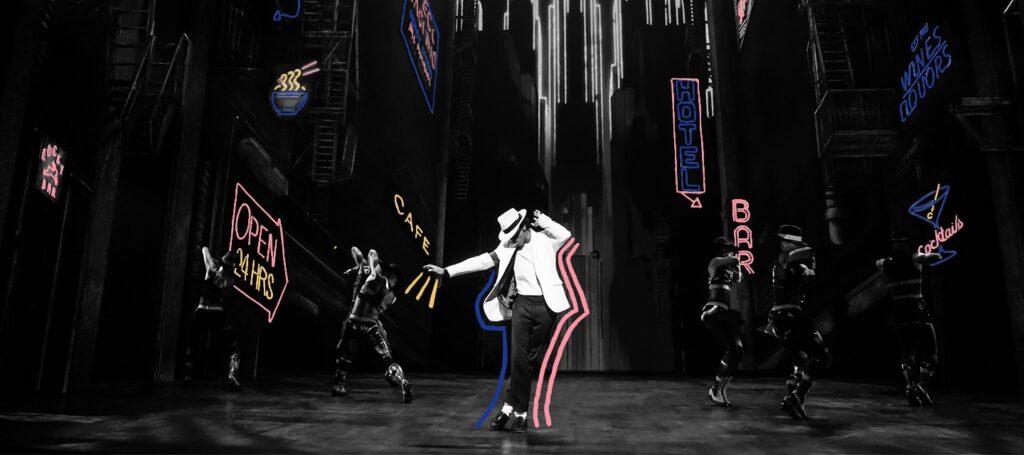


‘MJ’ Trips Into the Bio-Musical Morass
MJ, the new Broadway musical about Michael Jackson’s life, is currently thrilling audiences at the Neil Simon Theatre for all the wrong reasons. The show follows MJ―who functions as our narrator―as he balances getting his Dangerous world tour off the ground with interruptions from a documentary filmmaker for MTV who wants an exciting scoop, and flashbacks from his tragic past as Little Michael (of the Jackson 5 era) and Michael (the teenager who became a breakout star), with his dancers and colleagues suddenly transforming into members of his family.
Songs from his extensive catalog appear throughout the show haphazardly. When they take place during rehearsal scenes, such as when Michael is tinkering with a new idea, they leave the audience buzzing with nostalgia and wonder. But when they are forced into awkward dramatic moments that they were never meant to fulfill―for instance, Michael sitting off in the corner singing snippets of a sad song because he is a perpetually morose sap―the effect left me hyperventilating with queasiness.
But halfway through the musical, something magical happens: Tavon Olds-Sample embodies the plight of a teen-aged Michael’s fight to escape his father’s abuse and transform into the star that inspired hundreds of millions of fans across the globe.
This transcendent evolution occurs in three phases: through Olds-Sample’s dancing―as he sheds the over-rehearsed and canned quality of the Jackson 5 to unfurl a rhapsodic groove that tingles from his head bops down to his toe hops; a vocal feat of gradual sonic maturation―wherein Olds-Sample dispenses with the sweet bubble-gum texture of Michael’s childhood and snaps into the sly, rock-hardened edge that defined nearly three decades of his sound; and a sudden burst of star power―where he was once an awkward teen, Olds-Sample exudes enough charisma to rival the Michael Jackson of “Don’t Stop ‘til You Get Enough.”
Much like the actual star he is portraying, Olds-Sample is nothing short of scintillating as he seizes the show’s reins and demands that we focus on the period that defined so much of what Michael Jackson would accomplish over the next 10 years.
In a spectacular feat of storytelling, playwright Lynn Nottage and director-choreographer Christopher Wheeldon use this sequence to plumb the depths of Michael’s innovation, musical genius, showmanship, and rage by illustrating his process of trading riffs with Quincy Jones (Apollo Levine) and his sound engineer until they’ve given birth to a sonic revolution.
Shockingly, this entire moment is accomplished within 10 minutes, after which the musical returns to the morass of its Jackson estate-approved script and by-the-numbers, flashback-wards-then-forwards biographical approach. That’s what’s most offensive about this massive endeavor; rather than ruminate in the juices of its own brilliance and focus on one exciting moment, the show does the most to achieve the least by cramming in everything and the kitchen sink from Jackson’s life.
The end product is so busy talking about everything that he experienced―from his childhood to the early 90s; or mentioning but not talking about the allegations of sex abuse (why bother?)―that there is little time to investigate the man behind the caricature.
It’s hard to blame Nottage and Wheeldon for the Vegas-style, cosplay, karaoke-mash that ensues when it’s clear that they were hemmed-in by the estate. There are no winners in this spectacle of narrative obviousness which possesses as much mystery as a Wikipedia article. What begins cleverly enough with the first flashback, inspired by innocuous questions from a documentary filmmaker, is soon undone by the constant reminder of what makes MJ run: Joseph Jackson’s (Quentin Earl Darrington, smoldering and menacing) abuse.
The musical takes pains to impress upon us that everything MJ ever accomplished was in response to the fear and competitiveness that his father instilled in him. MJ actually references some variation of this point at least five times over the course of the two-and-a-half-hour-long evening. This is awkward because just about any adult who knows about Michael Jackson’s life is aware of the pater familias’ horror, which begs the question: why is the show so eager to focus on it to the exclusion of anything revelatory?
That’s not to say that there is little to gain from watching the theatrical re-enactment of everything that is already known about one of the modern era’s biggest stars―but given the hours of televised performances, concerts, and music videos that are readily available online, I was expecting to learn something that I didn’t already know or to experience a moment as thrilling as the real thing.
With apologies to the talented Christian Wilson (Little Michael at the performance I attended), no one should ever be tasked with portraying Michael Jackson as a child. Wilson hits his marks, but young Michael Jackson was one of the greatest performers in history.
As MJ, our main Michael, Myles Frost, faces a similar conundrum of failing to match the original. Vocally he is as talented as the star was during the period of the Dangerous tour; when he finally launches into “Thriller,” Frost sounds as awesome as Jackson ever did in live performances, and he dispatches his moonwalks as if he were to the celestial body born. But, while he works hard to master Jackson’s heroic histrionics and mouth-ography, Frost winds up delivering the performance of a well-rehearsed impersonator who doesn’t quite believe in the preposterousness of what he’s doing.
Consider the phenomenon of ballroom, wherein participants frequently reference attaining the “bizarre”: a moment when what is happening is so balls-to-the-walls outrageous that one can’t help but worship what they are seeing, even if it is nothing more than cleverly arranged scraps of fabric, tape, rouge, and a ratty wig. Of course, MJ’s budget offers much more than that; and it’s not as if Frost is incapable. But whenever it feels as if he is on the verge of tapping into something brilliant, the show’s repeated flashbacks interrupt before he can break through.
Where Frost soars is with his acting as a passive-aggressive control freak who manipulates and kills his subordinates with kindness, only to remind them that he could fire and replace everyone on set at any moment if he doesn’t get what he wants. But, much like the specter of his father, we hear this so often that the threat soon loses its sting.
What remains of this frustrating evening is some clever dialogue from Nottage―Michael quips that he has to do something because if he doesn’t, Prince will―an incredibly talented cast―especially Ayana George’s dynamic vocals as the otherwise useless Katherine Jackson (who duets with Little Michael on “I’ll Be There,” but never is) and Raymond Baynard’s attention-stealing charisma and movement quality as the Dangerous tour’s dance captain―wonderful movement language from Wheeldon and his choreographic colleagues―the “Michael Jackson” movement choreographers Rich + Tone Talauega and associate choreographers Michael Balderrama and Martha Nichols―and Paul Tazewell’s uncanny replications of the Jackson crew’s original costumes.
Contrary to my lackluster response, the audience gave the performance I attended a standing ovation and frequently cheered throughout when they recognized iconic moments from Jackson’s past. For my part, after I got home, I went online and got drunk on hours of his wunderkind performances. Perhaps that is what the estate actually wanted; to rejuvenate its coffers by sending audiences thirsting for the real thing. If so, at least in this instance, they certainly succeeded.
Keep Reading

Dominique Morriseau Excavates the Glory of Blackness in ‘Skeleton Crew’
As Black folks like to say, when Dominique Morisseau wrote Skeleton Crew, she put her whole foot in it. For those who aren’t in the know, that means the play is a spectacular blend of lyrical language, political analysis, and delightful humor that prioritizes Black lives and sensibilities over respectability politics. The play follows three […]
Read More
Have Yourself a Very DTLI Christmas
The DTLI Critic Cohort got together to bask in some holiday season warmth by sharing their favorite shows of the year, favorite theater moments, and their resolutions for the new year. Jose Solís: What was your favorite night out on Broadway? Ran Xia: Isn’t that just Six uncontested? Christian Lewis: Yes, Six and Diana […]
Read More












